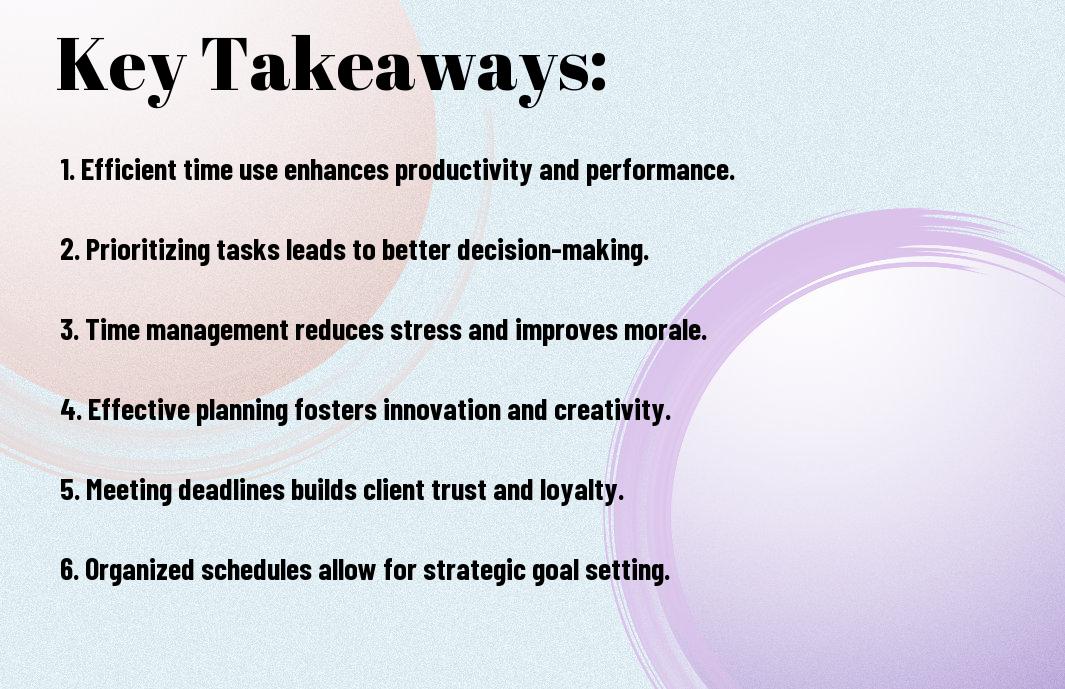Just as you would carefully manage your financial resources, effective time management is vital for driving your business growth. By prioritizing tasks and allocating your hours wisely, you can focus on what truly matters, streamline operations, and enhance productivity. This post will explore the benefits of mastering time management techniques, helping you to maximize your efficiency and achieve your business goals more effectively. Understanding how to manage your time can be a game changer, leading to increased profitability and a competitive edge in the marketplace.

Understanding Time Management
Before you can effectively manage your time, it is crucial to recognize its significance in achieving your business goals. Time management involves planning and exercising conscious control over the amount of time spent on specific activities. This process enables you to prioritize tasks, streamline operations, and enhance productivity, ultimately leading to sustained business growth.
Definition of Time Management
Beside its basic premise of allocating time efficiently, time management encompasses strategies that help you make better decisions about how to use your available hours. It is not merely about scheduling tasks but also ensuring that your efforts align with your objectives, allowing you to work smarter rather than harder.
Key Principles of Effective Time Management
Between knowing how to prioritize tasks and maintaining focus, effective time management hinges on a few fundamental principles. These core concepts include setting clear goals, prioritizing according to importance, delegating tasks when appropriate, and regularly reviewing your progress. By adhering to these principles, you can significantly enhance your efficiency and productivity.
Principles of effective time management require application and consistency. Setting SMART goals—Specific, Measurable, Achievable, Relevant, and Time-bound—will guide your focus. Prioritization matrices help you distinguish between urgent and important tasks, while delegating responsibilities empowers your team, allowing you to concentrate on high-impact activities. Consistently assessing your progress keeps you accountable, ensuring that you stay on track toward accomplishing your business objectives.
The Impact of Time Management on Business Growth
Some entrepreneurs underestimate the profound effect that effective time management can have on business growth. By utilizing time wisely, you not only streamline operations but also enhance your team’s overall performance, leading to sustainable expansion and increased competitiveness in the marketplace.
Increased Productivity
Any business owner who prioritizes time management will notice a significant boost in productivity. When you effectively allocate time to various tasks, you empower yourself and your team to focus on what truly drives results, reducing procrastination and increasing output.
Improved Decision Making
Beside the tangible benefits of productivity, effective time management fosters better decision-making processes. When you allocate sufficient time to evaluate your options and collect necessary information, you make choices that align with your business goals and long-term vision.
A structured approach to time management allows you to analyze situations thoroughly before acting, leading to more informed decisions. By dedicating focused time for strategic planning and reflection, you can weigh alternatives and consider potential outcomes. This strategic mindset not only prevents hasty decisions but also enhances your confidence in the choices you ultimately make, directly influencing your business’s growth trajectory.

Strategies for Effective Time Management
Many business leaders struggle with time management, yet effective strategies can significantly enhance your productivity and overall growth. By implementing structured approaches, you can allocate your resources efficiently, minimize distractions, and maximize output. Techniques like prioritizing tasks and scheduling your time can transform how you work, ensuring that you focus on what truly drives your business forward.
Prioritization Techniques
After identifying your goals, it becomes important to prioritize tasks effectively. Utilizing methods such as the Eisenhower Matrix can help you distinguish between urgent and important tasks. By categorizing your activities, you can allocate your time to those that align with your overall objectives, ensuring that your efforts contribute directly to business success.
Time Blocking and Scheduling
Across the business world, time blocking has gained popularity as a means to enhance productivity. This technique involves setting aside specific blocks of time for various tasks, allowing you to maintain focus and avoid distractions. By creating a structured daily or weekly schedule, you can allocate time for both important tasks and necessary breaks, optimizing your work efficiency.
A well-organized time blocking schedule helps you establish clear boundaries around your tasks, ensuring that you dedicate adequate time to each responsibility. By visualizing your workload, you can identify periods of high productivity and adapt your approach based on your energy levels. This method not only improves your focus but also allows for strategic planning, so you can address high-priority tasks while still leaving room for spontaneity and creativity in your workday.
Tools and Resources for Time Management
Once again, effective time management is significantly enhanced by utilizing the right tools and resources. By incorporating various aids into your routine, you can streamline tasks and improve productivity. Whether you prefer digital solutions, physical planners, or a combination of both, understanding available options will empower you to make informed decisions that support your business growth.
Digital Tools and Applications
Between project management software, calendar apps, and task trackers, digital tools offer a range of functionalities to help you manage your time effectively. By choosing applications that align with your workflow, you can automate reminders, set deadlines, and collaborate with your team, leading to a more organized and efficient business environment.
Physical Planning Aids
Digital tools can be complemented by physical planning aids that provide a tangible way to visualize your schedule and tasks. You may find that writing things down helps solidify your commitments, making it easier to prioritize and keep track of your responsibilities. Whether you prefer planners, bullet journals, or wall calendars, physical aids can clarify your objectives and manage your time better.
With physical planning aids, you can break down your day into manageable segments. These tools allow you to allocate time slots for specific tasks, ensuring you stay focused and avoid distractions. Incorporating items like sticky notes, colored pens, or even vision boards can further enhance your organizational skills, enabling you to see deadlines and priorities at a glance. By finding a physical system that resonates with you, you can effectively balance your workload and drive your business forward.

Overcoming Common Time Management Challenges
Not mastering time management often leads to missed deadlines and stunted growth within your business. Understanding and overcoming common challenges is important for improving productivity and achieving your goals. By identifying specific obstacles, you can implement effective strategies that enhance your ability to prioritize tasks and manage your time effectively.
Procrastination
Around 20% of adults struggle with procrastination, which can severely hinder your progress. To combat this habit, it’s vital to break tasks into smaller, manageable parts and set specific deadlines for each. By establishing accountability—whether through self-imposed deadlines or external partners—you can create a sense of urgency that motivates you to take action.
Distractions and Interruptions
Challenges in focus can sabotage your productivity, as both distractions and interruptions often derail your plans. Common distractions include social media, notifications, and even a cluttered workspace. By creating a dedicated environment for work, setting boundaries with colleagues, and scheduling specific times to check messages or engage in social media, you can significantly reduce these interruptions and maintain your focus on what’s important.
Indeed, managing distractions effectively requires a proactive approach. Identify specific triggers that lead you to lose focus and take steps to mitigate them. This might involve utilizing apps that block distracting websites, designating certain hours for uninterrupted work, or cultivating a workspace free from visual clutter. By making these adjustments, you can create an environment that fosters concentration and ultimately contributes to your overall efficiency and success.
Measuring the Success of Time Management Practices
After implementing effective time management strategies, it is necessary to measure their impact on your business growth. This helps you identify which practices yield positive results and which require improvement. By closely monitoring your time allocation and productivity levels, you can make data-driven decisions that foster continuous growth and lead to better outcomes for your organization.
Setting Goals and KPIs
Against a backdrop of shifting priorities, establishing clear goals and Key Performance Indicators (KPIs) is vital for tracking the effectiveness of your time management. These benchmarks provide a reference point that helps you assess whether your time is being spent effectively. By aligning your goals with measurable outcomes, you can identify areas for improvement and ensure your efforts contribute to business growth.
Regular Evaluation and Adjustment
Against the norm of static planning, regularly evaluating your time management practices is paramount for sustained success. By systematically reviewing your strategies and their results, you can adapt to changing circumstances, respond to new challenges, and capitalize on opportunities that arise over time.
KPIs play a significant role in this evaluation process by providing quantifiable metrics that reflect your progress. Analyzing these indicators allows you to spot trends, assess the impact of your time management techniques, and make informed adjustments. Regular assessments ensure that your strategies remain aligned with your business objectives, enabling you to stay agile and responsive to the evolving needs of your organization.
Conclusion
With this in mind, effective time management is important for fostering business growth. By prioritizing your tasks, setting clear deadlines, and eliminating distractions, you can significantly enhance productivity and drive results. Your ability to allocate time wisely not only boosts your performance but also improves your overall decision-making. Embracing these practices empowers you and your team to leverage opportunities, ensure project completion, and sustain your competitive edge in the market. Invest in mastering time management for a thriving business future.





